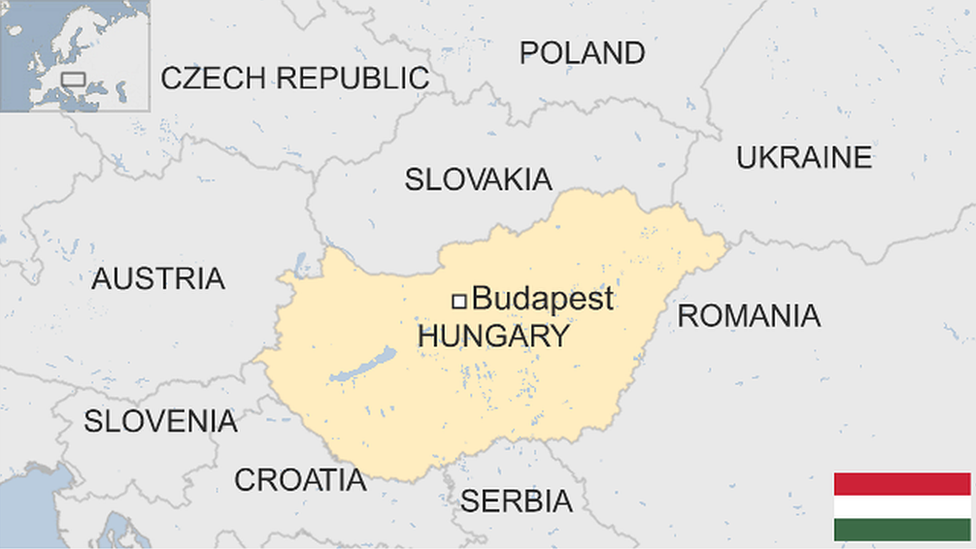March by far right raises concern for Hungary's Roma
- Published
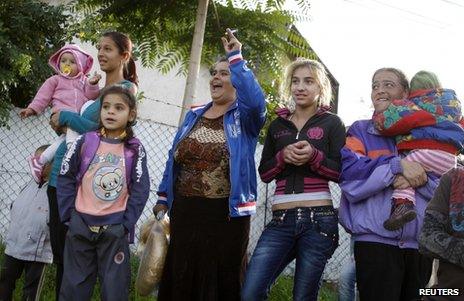
Women turned out to cheer the Roma rally in Miskolc
The east Hungarian city of Miskolc has seen a march by several thousand supporters of the far-right Jobbik party in protest against "Gypsy crime", and a counter-demonstration by 1,000 Roma (Gypsies) and their supporters against the party's "Nazi ideology".
Communism was kind to Miskolc. In 1980 the city boasted 207,000 inhabitants. The Avas housing estate was built to accommodate 35,000 new workers flooding in from the countryside to work in the steel mill and a host of other factories.
Capitalism has been a rougher experience. Factories collapsed like dominoes in the early 1990s. Those who could moved away. The population of the city is now 167,000. The unskilled - particularly, but not only Roma - have been the hardest hit, both in the city and the surrounding countryside.
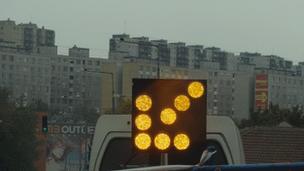
The Avas estate was built during an industrial boom
"As a child, we longed to live in Avas, but the waiting list was very long," remembers Mariann Demeter, a Roma woman who runs her own hairdressing and beauty parlour in Avas 3.
Her father worked in the steel mill, her mother in the hospital. Avas is divided into three sections, climbing the hill of the same name. Mariann employs both Roma and non-Roma staff, and her customers are equally mixed. On the day of the march she closed for the day and joined the Roma gathering.
Other Roma were more cautious. One young woman, who gave her name only as Gabriella, said she had fetched her children early from school, hurried them home and locked the doors.
She lives in Avas 2, in one of the most notorious blocks. Most of the windows in the stairwells are broken. The doors of better-off families are reinforced. Some of the tenants, Roma and non-Roma, pose for a photograph together. "We get on fine here," they say.
'Nest-builder scandal'
Imre, who has lived in the block since it was built, says it deteriorated when a "nest-building" programme was launched by the previous, Socialist-run city administration.
Designed to give poor families a chance to buy their first flats, it was exploited by a group of largely non-Roma lawyers and businessmen, who ran off with the subsidies on offer after installing the poorest of the poor in the flats - rural Roma who had never lived in a home with running water or indoor toilets and had no income.
The "nest-builders", as around 300 families are now known, became the terror of the estate, ripping out metal fittings to sell as scrap, selling the baths and basins, and living sometimes 30 to a room.
This offended the long-term Roma residents as much as the non-Roma ones. Several hundred people now stand accused of fraud in a long-running court battle. About 100 "problem families" remain, but other Roma complain they have been tarred with the same brush.
"The situation is like a road accident, in which the person who got hit is left bleeding in the road, while the police pursue the driver," says Mariann.
What angers residents today is that Jobbik, and the media, paint the Avas housing estate as a single black hole, rather than as a self-respecting district with localised problems in dozens of flats and stairways.
The streets are clean and almost beautiful in the autumn sunshine, lined with trees, their leaves turning yellow and gold. There is no litter, even around the recycling bins.
The 10-storey buildings look no less dilapidated than those built in the 1970s in London, Berlin or Paris. Norbert Petrusko, a local journalist, complains that the value of his flat in Avas 3 has fallen by more than half in five years, just because of the bad reputation of the estate.
Vera, Imre's neighbour in Avas 2, has been trying to sell her flat for six years - in vain.
Conflicting claims
Peter Jakab, a Jobbik councillor and a main organiser of the far-right demonstration, is unrepentant: "This protest is a warning signal to the government.
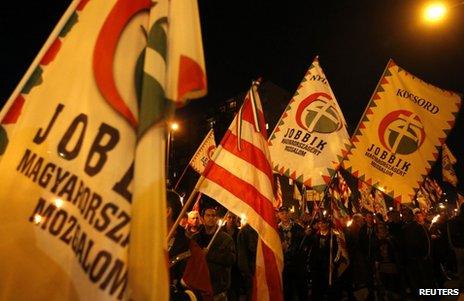
Jobbik supporters rallied with torches and flags
"We have had enough. For 22 years, Avas and Miskolc have become a symbol, a centre of squalor, of crime, of the lack of public order."
He taught history in a Roma secondary school until he was sacked for running for office in the Jobbik colours.
The answer, he says, is the eviction of families who do not pay rent or public utility bills, more police, tougher prisons, and an "end to the terror". His party got 17% in the local elections in Miskolc - the same as their proportion in the national parliament.
County police challenge Jobbik claims that crime is rising in the housing estate. Statistics released to coincide with the demonstrations show cases of assault and burglaries at their lowest level on the estate for four years, and lower than comparable-sized towns elsewhere in the country.
Roma organisations say solidarity, not punishment, is the answer.
"The poorest of the poor need help not Nazi ideology," says Gabor Varadi, of the local Roma self-government. "The real crime here is hate speech."
Aladar Horvath, leader of the Roma Civil Rights Movement in Hungary, says Wednesday's demonstration was the beginning of something new: "We need Roma unity, then we need an agreement between the Roma and Hungarian society."
The Roma demonstration was "not against the government, but against the state and its discriminatory, feudal policies", he says.
- Published1 September 2012
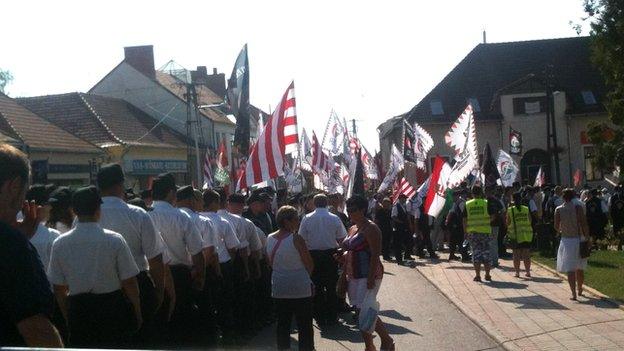
- Published4 June 2024
